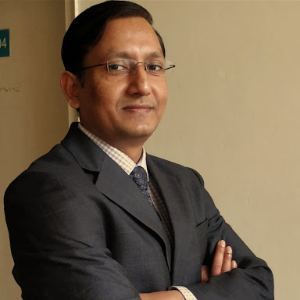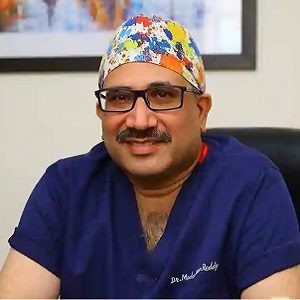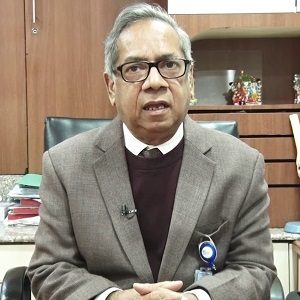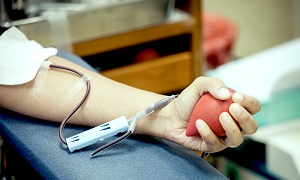Best Doctors in India for Hip Replacement
- Orthopedic & Spine Surgeon, New Delhi, India
- Over 14 years’ experience
Profile Highlights:
- Dr. Om Prakash Gupta is a reputed Spine Surgeon in India.
- He is currently functioning as a Consultant – Orthopedics & Spine at Max Smart Super Speciality Hospital, New Delhi
- He has over 14 years of experience.
- Orthopedic Surgeon, Chennai, India
- Over 21 years’ experience
Profile Highlights:
- Dr. A Navaladi Shankar is a well-known spine surgeon and orthopedist in Chennai with 21+ years of experience.
- He completed an MBBS from Al-Ameen Medical College, MNAMS from the National Board of Education, and a Diploma from Sri Ramachandra Medical College and Research Institute.
- Dr. Shankar holds expertise in Laminectomy, Lower Back Pain and Neck Pain Treatment, Arthritis Management, and Trauma Surgery.
- Orthopaedic Surgeon, Chennai, India
- Over 22 years’ experience
Profile Highlights:
- Dr. Kornad P Kosygan is one of the few Orthopedic surgeons in India with a double FRCS degree.
- He has been successful in the diagnosis and treatment of severe Orthopedic problems throughout his career.
- Dr. Kornad is invited as an exclusive Orthopedics Specialist from over six countries in the Asian and European subcontinent.
- Dr. Kosygan has sought extensive training and exposure in the department of Orthopaedics.
- Orthopaedic Surgeon, Chennai, India
- Over 25 years’ experience
Profile Highlights:
- Dr. Madan Mohan Reddy is one of the most acclaimed Orthopedic Surgeons in India with tons of experience and knowledge that he gained over the course of years.
- He has attended several courses across the world, in countries like Switzerland, Germany, Australia, and Italy.
- Orthopedic Surgeon, New Delhi, India
- Over 42 years’ experience
Profile Highlights:
- As one of the most experienced orthopedic surgeons in Delhi, Dr. Chander Shekhar has been practicing for 42 years. He is associated with Indraprastha Apollo Hospital as a consultant.
- Dr. Chander Shekhar is interested in Knee and Hip joint replacement and revision.
- He honed his expertise by completing a fellowship in shoulder and knee arthroscopy in the United States. Besides replacement & revision surgery, he has expertise in Birmingham Hip Resurfacing, BHR with stem, and Minimally Invasive Surgery.
- Orthopedic Surgeon & Spine Surgeon, New Delhi, India
- Over 18 years’ experience
Profile Highlights:
- Dr. Amit Kumar Agarwal is a Delhi-based orthopedic, joint replacement, and spine surgeon consultant who has been assuring joint and spine health for about 18 years.
- Dr. Agarwal has garnered numerous accolades for his work in treating Joints and Musculoskeletal Disorders, pain management, sports injury, and articular degeneration during his career.
- Orthopedic Surgeon, New Delhi, India
- Over 22 years’ experience
Profile Highlights:
- Dr. Vibhu Bahl is one of the finest Orthopedist and Joint Replacement Surgeon in India. He has experience of over 22 years in this field.
- Dr. Bahl has successfully performed multiple complex and primary total knee and hip replacements over his career. Besides these, he specializes in computer-assisted total knee replacements. Patients seeking Arthroscopy for shoulder dislocation, degeneration, and repair must consult him.
- Dr. Bahl participated as a Faculty in many Arthroscopy conferences.
- He is passionate about research and has a long list of publications in prestigious national and international journals.
- Orthopedist, New Delhi, India
- Over 20 years’ experience
Profile Highlights:
- Dr. Havind Tandon is one of the best Orthopedists in Delhi, having nearly two decades of experience. He practices as a senior consultant at Indraprastha Apollo Hospital.
- Many patients who need a knee replacement, repair, or osteotomy have benefitted from his enthusiasm and skill in the field.
- Dr. Havind Tandon worked with Jhonson & Jhonson as a Facilitator for the National Joint Replacement Program.
- Pain management counseling, Joint Replacement Surgery, Spinal Therapy, reverse shoulder replacement, neuropathy assessment, foot drop, treatment of complex fractures, and Adult Joint Reconstruction are just a few of the vital services provided by Dr. Havind Tandon.
- Dr. Tandon was also recognized for his work in the field of research.
- Orthopedic and Spine Surgeon, Gurugram, India
- Over 25 years’ experience
Profile Highlights:
- With over 25 years of experience, Dr. Rajesh Kumar Verma can be generally considered a boon for people suffering from complex, bone, joint, or spine disorders.
- Currently known as one of India’s leading spine experts in India, Dr. Rajesh Kumar Verma performs as many as 50 surgeries in a month. The types of surgeries he performs include all types of spine surgeries, joint replacements, as well as complex trauma surgeries.
- Orthopedic Surgeon, Chennai, India
- Over 25 years’ experience
Profile Highlights:
- Dr. Krishnamurthy K provides consultation at the Apollo hospitals of Chennai.
- He has also worked as a senior registrar and assistant surgeon earlier and has sound knowledge of his field.
- One can reach Dr. Krishnamurthy K for treatment of fractures, joints, shoulders, knees, hip replacement, etc.
Best Hip Replacement Hospitals in India
Fortis Hospital, Shalimar Bagh
- City: New Delhi, India
Hospital Highlights:
- Fortis Hospital in Shalimar Bagh is a multi-super specialty hospital that strives to provide world-class patient care by leaving no stone unturned.
- Fortis, Shalimar Bagh, with 262 beds and a 7.34-acre footprint, provides the best level of medical care through its team of doctors, nurses, technicians, and management professionals.
Reliance Hospital, Mumbai
- City: Mumbai, India
Hospital Highlights:
- Reliance Hospital is one of the best super-specialty care hospitals in Navi Mumbai.
- The main purpose of this hospital is to become a trustworthy place for the best health and hope for society. The hospital is well connected to the suburbs of Mumbai and Navi Mumbai.
- The hospital has various specialty departments, viz., Accident & Emergency, Anesthesiology, Dental Services, Dermatology, Diabetology, Dietetics Nutrition, Endocrinology, ENT, Gastroenterology, General Surgery, Gynaecology And Obstetrics, Hepato Pancreato Biliary Surgery, Infectious Disease, Internal Medicine, Interventional Radiology, Laboratory Medicine, Minimal Access Laparoscopic Surgery, Nephrology, Neurosciences, Opthalmology, Orthopaedics, Paediatrics, Pain Management Palliative Care, Physical Medicine Rehabilitation, Plastic And Reconstructive Surgery, Psychiatry, Pulmonary Medicine, Radiology, Rheumatology, Transplant, Urology Andrology, Vascular Surgery
Lilavati Hospital & Research Centre, Mumbai
- City: Mumbai, India
Hospital Highlights:
- Lilavati Hospital & Research Centre is India’s premier multi-speciality tertiary care hospital and has been recognised as a global medical excellence centre.
- Lilavati Hospital & Research Centre has built an unrivalled level of trust with its patients over the years, thanks to a solid foundation that comprises cutting-edge facilities, the best medical competence, research, education, and charity endeavours.
- The hospital is quite proud of the fact that it now serves patients from all kinds of backgrounds, not just from the United States but from all around the world.
- The hospital has a total of 323 beds, one of the largest Intensive Care Units (ICUs), 12 Operation Theatres with modern amenities, over 300 consultants, and almost 1,800 personnel.
Venkateshwar Hospital, Dwarka, New Delhi
- City: New Delhi, India
Hospital Highlights:
- State-of-the-art technology and devoted healthcare professionals have been brought together under one roof at Venkateshwar Hospital to provide genuine medical care. The hospital’s professionals work together as a team to deliver the best possible treatment to their patients, using the most sophisticated equipment and information technology.
- Venkateshwar Hospital’s mission is to attain global excellence in healthcare by employing evidence-based, ethical clinical practices and cutting-edge technology by a team of highly skilled experts.
MGM Healthcare, Chennai
- City: Chennai, India
Hospital Highlights:
- Located in Chennai, India, MGM Healthcare is a top multispecialty hospital that provides all medical services under one roof.
- Since its founding in 2019, MGM Healthcare has quickly become a leading national referral centre, creating several innovative flagship initiatives.
- MGM Healthcare combines next-generation medical and digital technologies to provide better patient results.
- With 12 centres of excellence, more than 400 inpatient beds, 100 intensive care unit beds, and 24/7 emergency care, MGM Healthcare leaves no chance in redefining the patient experience in Chennai.
- MGM Healthcare boasts 250+ expert doctors across 30+ departments, including Cardiology, Pulmonology, Neurology, Obstetrics & Gynaecology, and more.
- They house 12 specialized Centres of Excellence, including Neurosciences, Orthopaedics, and Multi-Organ Transplantation.
- Their team of doctors, nurses, and paramedics works together to give every patient individualized treatment.
Total Hip Replacement
Total Hip Replacement is a surgical procedure prescribed for people suffering from a bad or damaged hip. In this surgical procedure, the doctor removes the entire hip joint and replaces it with an artificial hip joint usually made of high-quality metal or plastic elements.
A total hip replacement is suggested when all the other primary treatment methods have shown unsuccessful recovery. The primary goal of this surgery is to remove the bad hip joint in order to reduce pain and stiffness while improving hip joint flexibility amongst patients.
Causes of Hip Damage
The primary cause for damage in the hip joint is due to osteoarthritis, a condition the promotes cartilage loss in the hip joint. Apart from osteoarthritis, other causes for a total hip replacement can be:
- Rheumatoid Arthritis
- Post-traumatic Arthritis
- Osteonecrosis
- Fracture or dislocation of the hip joint/bone
- Childhood disorders
Indications for Total Hip Replacement
Usually, general pain and stiffness of the bone is not enough for doctors to recommend a total hip replacement surgery. However, based on your symptoms, doctors might consider the possibility and ask for some diagnostic tests to determine the underlying cause of these symptoms. Some of these symptoms include-
- Intense pain even after taking pain relief medication
- Inflammation of the hip joint due to cartilage loss
- Difficulty during walking
- Difficulty in general movement of the hip joint
- Insomnia due to discomfort or pain
- Stiffness or hip joint locking
Alternative method to Total Hip Replacement
There’s an alternative method to hip replacement, known as the Birmingham Hip Resurfacing Surgery. This procedure is generally suggested for patients falling under the young category, for instance from infants to patients ageing between 40-50. In this surgery, instead of replacing the entire hip joint, the doctors resurface or shaves the damaged part of the hip joint and adds an artificial brace to the joint. This allows free movement and flexibility along with reduced pain. Even though this procedure is more favored over total hip replacement, the final verdict will be disclosed by your orthopedic surgeon based on the damage caused to the hip bone along with your age, weight, general immunity strength and more.
Apart from the two surgical options, other primary non-operative treatment methods may include:
- Pain-relief medications
- Physiotherapy
- Joint supplements
- Weight loss and change in day-to-day activities
Diagnostic tests needed
When the primary treatment methods fail, the doctor may suggest some diagnostic tests to determine the underlying cause and based on the test results, the surgical method is decided. Initial tests include movement or other physical tests along with X-ray, MRI or EKG tests to determine whether the problem is bone-related or neurology-related. Apart from that, the doctor may ask you about running bone or arthritis disorders in your family along with your past medical history.
Total Hip Replacement procedure explained
Preparation
There are no exclusive preparation methods for this surgery. However, the general preparation includes fasting 10-12 hours before the surgery including a 24-72 hour break from alcohol or tobacco consumption strictly. Patients are requested to help the medical team out with a detailed list of past medical history including bleeding disorders, past or ongoing medications including blood thinners, pain relief medications, OTC, herbal supplements, vitamins and even homeopathy medications, and any ongoing allergies to particular medications. Your medical team will help you out with detailed dietary chart for the days leading up to the surgery day and if you’ve not received a chart, we recommend asking your healthcare providers for possible dietary regulations.
Blood Donation
Total Hip Replacement Surgery
The total hip replacement surgery can be conducted in either of the two ways:
- Traditional method or the open-surgery
- Minimally invasive method.
Even though the procedure for both the methods remains the same, the only notable difference is within the size of the incision. In the latter method, the incision is kept minimum and the post-operation care, wound healing, recovery, and pain is usually less compared to the traditional method.
THR procedure is done under general anesthesia.
Once the artificial joints are put in place, the doctor checks for any additional cartilage or bone damage and removes it. The hip muscles are then put back in place and the incision is sewed shut.
Steps of Surgery
Total hip replacement is two-step surgery:
Step 1: The doctor makes an incision in the hip area and moves the hip muscles out of the way to reveal the hip joint. The ball of the joint connected to the femur is then shaved off and an artificial joint replaces the area. The artificial joint is usually made up of stems inserted and attached to the femur bone with the ball part sticking out.
Step 2: Now the doctor preps the hip bone socket removing any damaged cartilage or bone from the area. The artificial joint cup is inserted into the socket and the artificial joint attached to the femur bone is then fixed into the socket. An additional drain may be created to drain out the excess fluid accumulation in that region.
Once the artificial joints are put in place, the doctor checks for any additional cartilage or bone damage and removes it. The hip muscles are then put back in place and the incision is sewed shut.
Blood Transfusion
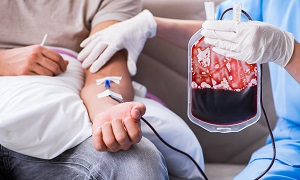
Since this surgical procedure may result in a lot of blood loss, doctors based on the patient’s blood loss rate might recommend a blood transfusion after the surgery.
Probable risks of Total Hip Replacement Procedure
Common risks or complications of the surgery include
- Infection
- Body’s reaction to the foreign artificial joints
- Breaking or fracturing of bones during the procedure
- Blood clots or bleeding disorder
- Artificial joint dislocation or loosening
- Metal on metal complications
One of the side-effects to total hip replacement may include shortening of one the limbs causing a change in leg length.
Post-operation care
What you can expect after your hip replacement surgery:
- Physical therapy will start after the day of the operation
- Patients will be given walkers or crutches to walk a few days after the surgery
- Patients will be requested to use a pillow or cushion in between the knees for the initial days to hold the artificial joints into position
- The incision stitches or staples will be cleared in the follow-up visit, usually, 2 weeks from the day of the surgery. However, the wound needs to be duly taken care of. Patients are requested to change the wound dressing every day to keep it clean and dry. Please do not put water, cream, ointments, or lotions on the wound without doctor approvals. Patients can return to their normal life within 3-6 weeks of the surgery. However, rotating or twisting of the hip joints is strictly prohibited for 6-1 months. Doctors advise patients to continue with physiotherapy as requested.
FAQs
How long will the hospital stay be for total hip replacement surgery?
The usual hospital stay for the hip replacement surgery is for 4-6 days but based on the patient’s recovery status or progress, the doctors might extend the hospital stay for better monitoring or management.
Can my hip replacement surgery fail?
Sometimes the artificial joints may fall out of place or get loose due to wear and tear or certain bone related complications might make it difficult, but in most, cases hip replacement surgeries have been successful.
What happens if the surgery fails?
In case your hip replacement surgery fails, based on your condition and your body’s reaction to the surgery, doctors might prescribe a second replacement surgery.
Can I climb stairs after the surgery?
Activities such as sitting on the floor or climbing stairs should be kept to minimum after the surgery.
Why do I feel pain even after the surgery?
It is normal to feel pain after a hip replacement surgery. However, the pain is limited to the initial days only, especially, during or after physiotherapy. If the pain persists even after the first 3 weeks, kindly contact your doctor.
Will my hip replacement surgery last forever?
Usually, hip replacements last for a good 10-12 years or more based on usage but wear and tear of the joint or loosening of the artificial joint might reduce the years.

